BUSM4497: Global HRM Policies for Gomez Telecom Across Three Countries
VerifiedAdded on 2023/01/23
|11
|3317
|83
Report
AI Summary
This memorandum analyzes global HRM policies for Gomez Telecom, a telecom service provider operating in Australia, Brazil, and China. It argues against a uniform HR policy, emphasizing the need for tailored talent and performance management strategies considering cultural differences, labor market dynamics, and institutional arrangements. The report recommends diverse leave policies, incentive structures, and training programs to effectively manage employees in each country. It highlights the importance of recognizing local festivals, adjusting appraisal frequency and incentive rates based on labor market size, and providing English language training where necessary. The memorandum concludes that a flexible, country-specific approach is crucial for attracting and retaining talented employees, ensuring long-term success in the global market.
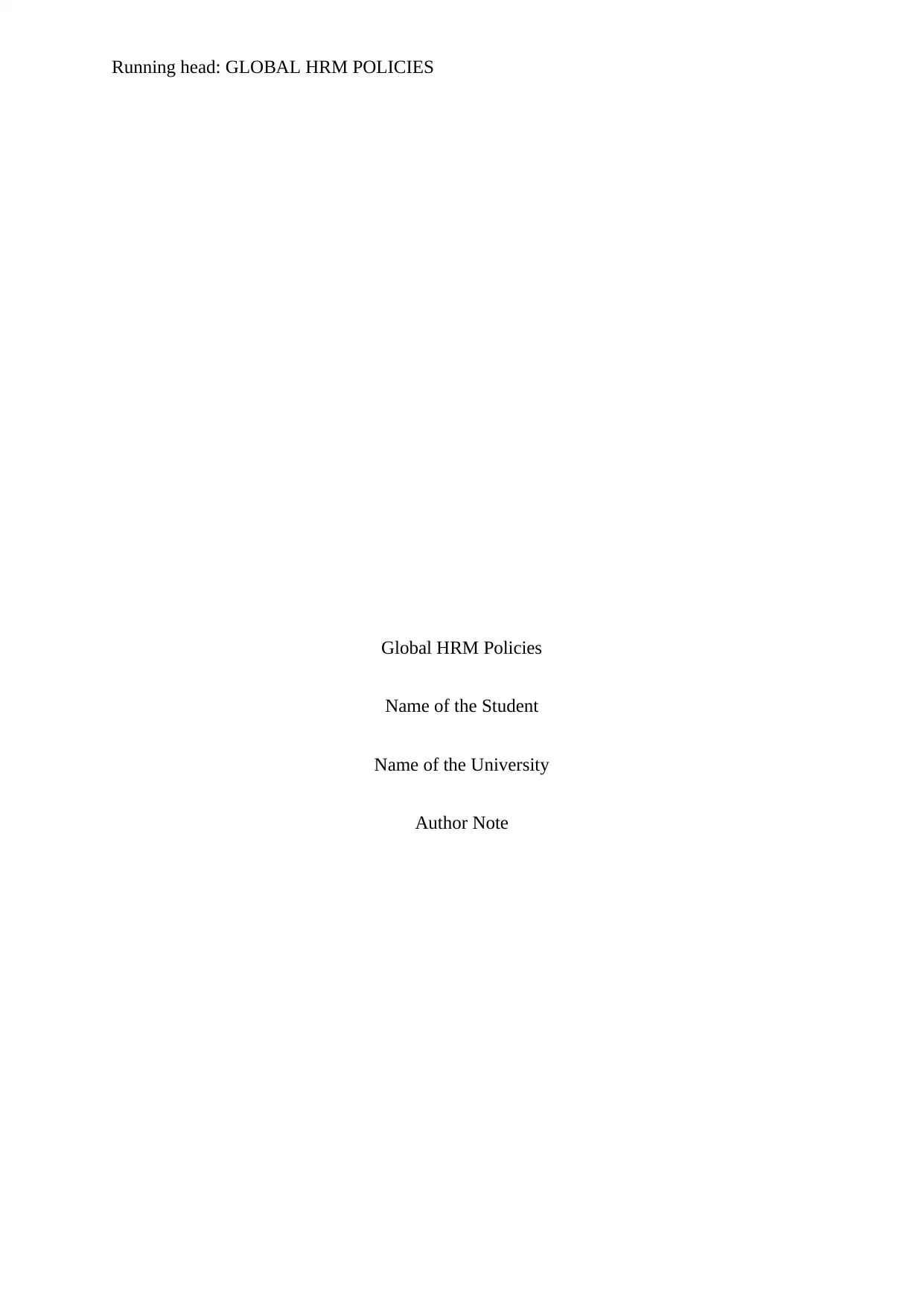
Running head: GLOBAL HRM POLICIES
Global HRM Policies
Name of the Student
Name of the University
Author Note
Global HRM Policies
Name of the Student
Name of the University
Author Note
Paraphrase This Document
Need a fresh take? Get an instant paraphrase of this document with our AI Paraphraser

2GLOBAL HRM POLICIES
Talent management and performance management constitute two vital aspects of
human resource management policies in each and every part of the globe (Cascio and
Boudreau 2016). While talent management focuses on managing and developing the skills
and the potential of gifted and dedicated employees who can and are willing to do their best
for an organization, performance management aims at improving the performance
capabilities of employees who are not able to performance up to the mark but who have the
capacity in them to do better than what they are doing at present. Performance management
also entails acknowledging the achievements of employees at the work place through the
granting of rewards, recognitions and appraisals on an annual basis (Moeller et al. 2017).
Although performance management and talent management have to be implemented by HR
departments of companies unanimously all around the world, there cannot be uniformity
where such policies are concerned as cultural differences, the labour market, institutional
arrangements and trade unionism prevalent in specific countries have to be taken into account
when drawing up HR policies for employees over here. The labor market in China is not the
same as Australia, neither is the culture of India similar to the culture of the United Kingdom.
Companies that engage in worldwide operations have to take a number of important factors
into consideration when implementing sound HR policies for long term benefit (Moeller et al.
2017). This essay analyzes in the form of a memorandum, how Gomez Telecom, a telecom
service provider running operations in Australia, Brazil and China can draw up a talent
management and performance management policy that will look into the benefits and
wellbeing of its employees in each of the three countries equally, with all factors such as
labor market, cultural differences, trade unionism and situational arrangements being taken
into consideration. This paper concludes that a uniform HR policy is undesirable for a global
business, given that the labor market and employee base serving such a business in one
location can be radically different from the same in another location.
Talent management and performance management constitute two vital aspects of
human resource management policies in each and every part of the globe (Cascio and
Boudreau 2016). While talent management focuses on managing and developing the skills
and the potential of gifted and dedicated employees who can and are willing to do their best
for an organization, performance management aims at improving the performance
capabilities of employees who are not able to performance up to the mark but who have the
capacity in them to do better than what they are doing at present. Performance management
also entails acknowledging the achievements of employees at the work place through the
granting of rewards, recognitions and appraisals on an annual basis (Moeller et al. 2017).
Although performance management and talent management have to be implemented by HR
departments of companies unanimously all around the world, there cannot be uniformity
where such policies are concerned as cultural differences, the labour market, institutional
arrangements and trade unionism prevalent in specific countries have to be taken into account
when drawing up HR policies for employees over here. The labor market in China is not the
same as Australia, neither is the culture of India similar to the culture of the United Kingdom.
Companies that engage in worldwide operations have to take a number of important factors
into consideration when implementing sound HR policies for long term benefit (Moeller et al.
2017). This essay analyzes in the form of a memorandum, how Gomez Telecom, a telecom
service provider running operations in Australia, Brazil and China can draw up a talent
management and performance management policy that will look into the benefits and
wellbeing of its employees in each of the three countries equally, with all factors such as
labor market, cultural differences, trade unionism and situational arrangements being taken
into consideration. This paper concludes that a uniform HR policy is undesirable for a global
business, given that the labor market and employee base serving such a business in one
location can be radically different from the same in another location.
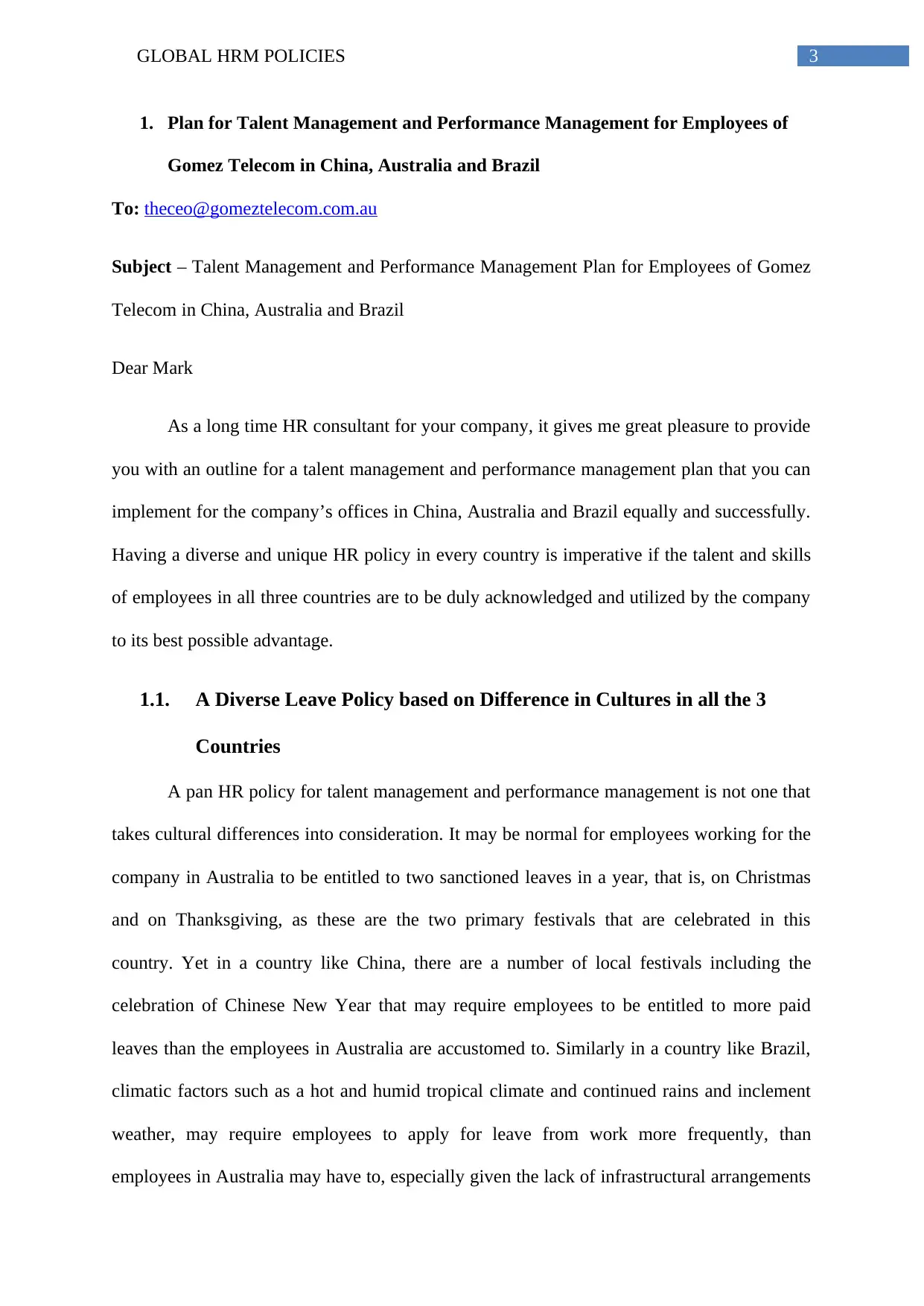
3GLOBAL HRM POLICIES
1. Plan for Talent Management and Performance Management for Employees of
Gomez Telecom in China, Australia and Brazil
To: theceo@gomeztelecom.com.au
Subject – Talent Management and Performance Management Plan for Employees of Gomez
Telecom in China, Australia and Brazil
Dear Mark
As a long time HR consultant for your company, it gives me great pleasure to provide
you with an outline for a talent management and performance management plan that you can
implement for the company’s offices in China, Australia and Brazil equally and successfully.
Having a diverse and unique HR policy in every country is imperative if the talent and skills
of employees in all three countries are to be duly acknowledged and utilized by the company
to its best possible advantage.
1.1. A Diverse Leave Policy based on Difference in Cultures in all the 3
Countries
A pan HR policy for talent management and performance management is not one that
takes cultural differences into consideration. It may be normal for employees working for the
company in Australia to be entitled to two sanctioned leaves in a year, that is, on Christmas
and on Thanksgiving, as these are the two primary festivals that are celebrated in this
country. Yet in a country like China, there are a number of local festivals including the
celebration of Chinese New Year that may require employees to be entitled to more paid
leaves than the employees in Australia are accustomed to. Similarly in a country like Brazil,
climatic factors such as a hot and humid tropical climate and continued rains and inclement
weather, may require employees to apply for leave from work more frequently, than
employees in Australia may have to, especially given the lack of infrastructural arrangements
1. Plan for Talent Management and Performance Management for Employees of
Gomez Telecom in China, Australia and Brazil
To: theceo@gomeztelecom.com.au
Subject – Talent Management and Performance Management Plan for Employees of Gomez
Telecom in China, Australia and Brazil
Dear Mark
As a long time HR consultant for your company, it gives me great pleasure to provide
you with an outline for a talent management and performance management plan that you can
implement for the company’s offices in China, Australia and Brazil equally and successfully.
Having a diverse and unique HR policy in every country is imperative if the talent and skills
of employees in all three countries are to be duly acknowledged and utilized by the company
to its best possible advantage.
1.1. A Diverse Leave Policy based on Difference in Cultures in all the 3
Countries
A pan HR policy for talent management and performance management is not one that
takes cultural differences into consideration. It may be normal for employees working for the
company in Australia to be entitled to two sanctioned leaves in a year, that is, on Christmas
and on Thanksgiving, as these are the two primary festivals that are celebrated in this
country. Yet in a country like China, there are a number of local festivals including the
celebration of Chinese New Year that may require employees to be entitled to more paid
leaves than the employees in Australia are accustomed to. Similarly in a country like Brazil,
climatic factors such as a hot and humid tropical climate and continued rains and inclement
weather, may require employees to apply for leave from work more frequently, than
employees in Australia may have to, especially given the lack of infrastructural arrangements
⊘ This is a preview!⊘
Do you want full access?
Subscribe today to unlock all pages.

Trusted by 1+ million students worldwide
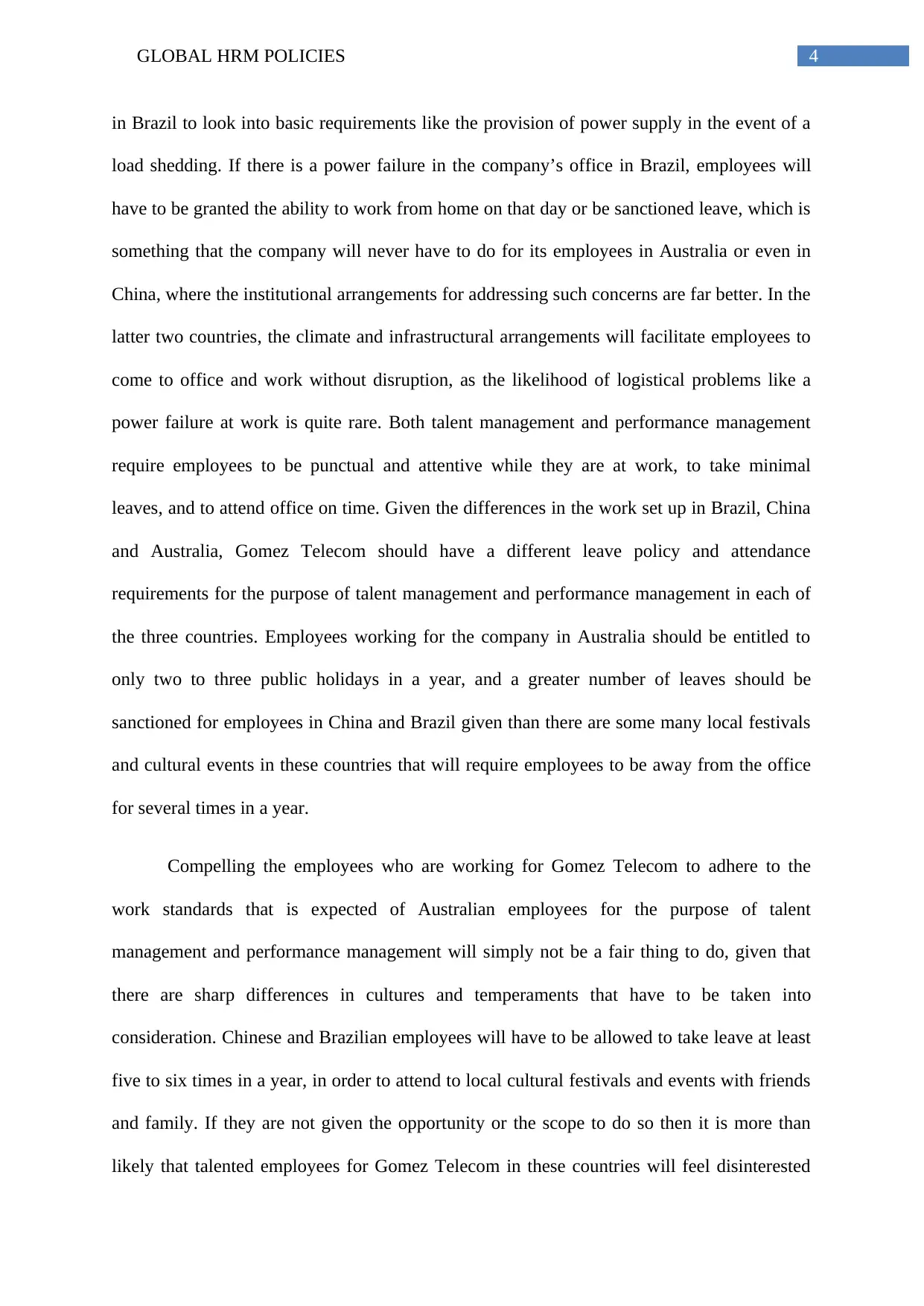
4GLOBAL HRM POLICIES
in Brazil to look into basic requirements like the provision of power supply in the event of a
load shedding. If there is a power failure in the company’s office in Brazil, employees will
have to be granted the ability to work from home on that day or be sanctioned leave, which is
something that the company will never have to do for its employees in Australia or even in
China, where the institutional arrangements for addressing such concerns are far better. In the
latter two countries, the climate and infrastructural arrangements will facilitate employees to
come to office and work without disruption, as the likelihood of logistical problems like a
power failure at work is quite rare. Both talent management and performance management
require employees to be punctual and attentive while they are at work, to take minimal
leaves, and to attend office on time. Given the differences in the work set up in Brazil, China
and Australia, Gomez Telecom should have a different leave policy and attendance
requirements for the purpose of talent management and performance management in each of
the three countries. Employees working for the company in Australia should be entitled to
only two to three public holidays in a year, and a greater number of leaves should be
sanctioned for employees in China and Brazil given than there are some many local festivals
and cultural events in these countries that will require employees to be away from the office
for several times in a year.
Compelling the employees who are working for Gomez Telecom to adhere to the
work standards that is expected of Australian employees for the purpose of talent
management and performance management will simply not be a fair thing to do, given that
there are sharp differences in cultures and temperaments that have to be taken into
consideration. Chinese and Brazilian employees will have to be allowed to take leave at least
five to six times in a year, in order to attend to local cultural festivals and events with friends
and family. If they are not given the opportunity or the scope to do so then it is more than
likely that talented employees for Gomez Telecom in these countries will feel disinterested
in Brazil to look into basic requirements like the provision of power supply in the event of a
load shedding. If there is a power failure in the company’s office in Brazil, employees will
have to be granted the ability to work from home on that day or be sanctioned leave, which is
something that the company will never have to do for its employees in Australia or even in
China, where the institutional arrangements for addressing such concerns are far better. In the
latter two countries, the climate and infrastructural arrangements will facilitate employees to
come to office and work without disruption, as the likelihood of logistical problems like a
power failure at work is quite rare. Both talent management and performance management
require employees to be punctual and attentive while they are at work, to take minimal
leaves, and to attend office on time. Given the differences in the work set up in Brazil, China
and Australia, Gomez Telecom should have a different leave policy and attendance
requirements for the purpose of talent management and performance management in each of
the three countries. Employees working for the company in Australia should be entitled to
only two to three public holidays in a year, and a greater number of leaves should be
sanctioned for employees in China and Brazil given than there are some many local festivals
and cultural events in these countries that will require employees to be away from the office
for several times in a year.
Compelling the employees who are working for Gomez Telecom to adhere to the
work standards that is expected of Australian employees for the purpose of talent
management and performance management will simply not be a fair thing to do, given that
there are sharp differences in cultures and temperaments that have to be taken into
consideration. Chinese and Brazilian employees will have to be allowed to take leave at least
five to six times in a year, in order to attend to local cultural festivals and events with friends
and family. If they are not given the opportunity or the scope to do so then it is more than
likely that talented employees for Gomez Telecom in these countries will feel disinterested
Paraphrase This Document
Need a fresh take? Get an instant paraphrase of this document with our AI Paraphraser

5GLOBAL HRM POLICIES
and even disheartened to work for the company and will instead prefer offering their services
to some local business which takes such things into consideration. Hence the suitable leave
policy must be drawn up specifically for China and Brazil, which differs from the leave
policy of the company in Australia, if talented employees who are capable of performing for
the company in these destinations are to be retained for the long term.
1.2. More Incentives and Appraisals for Australian Employees compared to
Chinese and Brazilian Employees based on the differences in the Size of
the Labor Market
The talent management policy and the performance management policy of Gomez
Telecom in China and Brazil needs to be vastly different from the same in Australia as the
labor market in Australia is quite small compared to the labor market in China and Brazil.
The population of Brazil is quite large and the population of China is the largest in the whole
world. The company will be able to drawn upon a greater amount of manpower in Brazil and
China than it will be able to in Australia(Tarique et al. 2015). Hence its talent management
and performance management activities in Australia have to be far more specific and
dedicated compared to its talent management activities in Brazil and China. If a meritorious
employee working for the company in Australia resigns, it can take the company several
weeks and months to get this employee replaced with a similar talented employee, given the
small size of the labor market (Ensour et al. 2017). In Brazil and China, this will not be
difficult for the company to do as there are hundreds and at times even thousands of people
who are applying for jobs every day, and if a meritorious employee resigns from the job, it
will not take the HR executives longer than a day or two to locate another employee with
similar skills and talents that can be used in order to fulfill the company’s objectives or
business goals in either of these two countries (Tarique et al. 2015). In other words, there is
sufficient manpower and skilled manpower at that in China and Brazil because of the large
and even disheartened to work for the company and will instead prefer offering their services
to some local business which takes such things into consideration. Hence the suitable leave
policy must be drawn up specifically for China and Brazil, which differs from the leave
policy of the company in Australia, if talented employees who are capable of performing for
the company in these destinations are to be retained for the long term.
1.2. More Incentives and Appraisals for Australian Employees compared to
Chinese and Brazilian Employees based on the differences in the Size of
the Labor Market
The talent management policy and the performance management policy of Gomez
Telecom in China and Brazil needs to be vastly different from the same in Australia as the
labor market in Australia is quite small compared to the labor market in China and Brazil.
The population of Brazil is quite large and the population of China is the largest in the whole
world. The company will be able to drawn upon a greater amount of manpower in Brazil and
China than it will be able to in Australia(Tarique et al. 2015). Hence its talent management
and performance management activities in Australia have to be far more specific and
dedicated compared to its talent management activities in Brazil and China. If a meritorious
employee working for the company in Australia resigns, it can take the company several
weeks and months to get this employee replaced with a similar talented employee, given the
small size of the labor market (Ensour et al. 2017). In Brazil and China, this will not be
difficult for the company to do as there are hundreds and at times even thousands of people
who are applying for jobs every day, and if a meritorious employee resigns from the job, it
will not take the HR executives longer than a day or two to locate another employee with
similar skills and talents that can be used in order to fulfill the company’s objectives or
business goals in either of these two countries (Tarique et al. 2015). In other words, there is
sufficient manpower and skilled manpower at that in China and Brazil because of the large
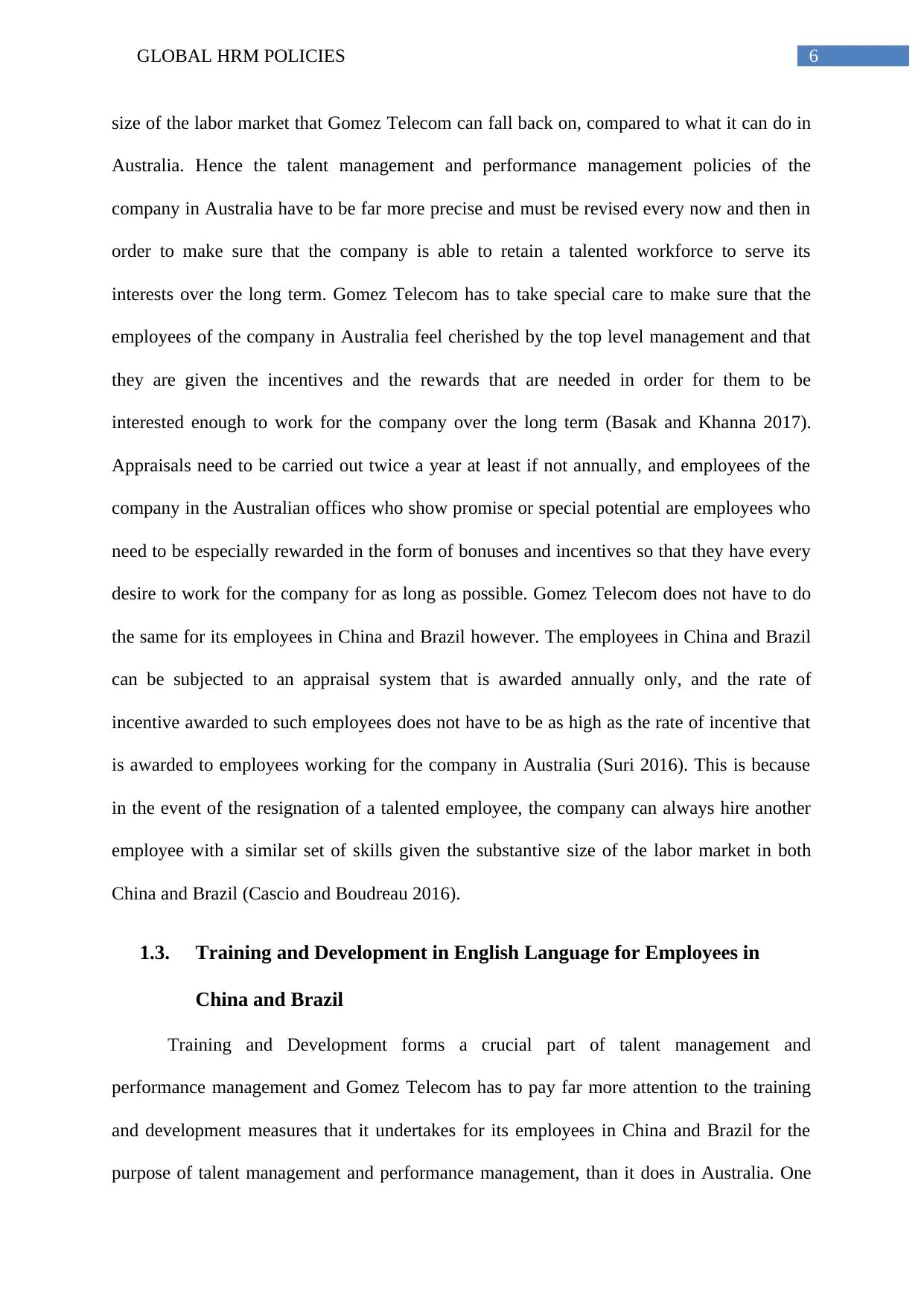
6GLOBAL HRM POLICIES
size of the labor market that Gomez Telecom can fall back on, compared to what it can do in
Australia. Hence the talent management and performance management policies of the
company in Australia have to be far more precise and must be revised every now and then in
order to make sure that the company is able to retain a talented workforce to serve its
interests over the long term. Gomez Telecom has to take special care to make sure that the
employees of the company in Australia feel cherished by the top level management and that
they are given the incentives and the rewards that are needed in order for them to be
interested enough to work for the company over the long term (Basak and Khanna 2017).
Appraisals need to be carried out twice a year at least if not annually, and employees of the
company in the Australian offices who show promise or special potential are employees who
need to be especially rewarded in the form of bonuses and incentives so that they have every
desire to work for the company for as long as possible. Gomez Telecom does not have to do
the same for its employees in China and Brazil however. The employees in China and Brazil
can be subjected to an appraisal system that is awarded annually only, and the rate of
incentive awarded to such employees does not have to be as high as the rate of incentive that
is awarded to employees working for the company in Australia (Suri 2016). This is because
in the event of the resignation of a talented employee, the company can always hire another
employee with a similar set of skills given the substantive size of the labor market in both
China and Brazil (Cascio and Boudreau 2016).
1.3. Training and Development in English Language for Employees in
China and Brazil
Training and Development forms a crucial part of talent management and
performance management and Gomez Telecom has to pay far more attention to the training
and development measures that it undertakes for its employees in China and Brazil for the
purpose of talent management and performance management, than it does in Australia. One
size of the labor market that Gomez Telecom can fall back on, compared to what it can do in
Australia. Hence the talent management and performance management policies of the
company in Australia have to be far more precise and must be revised every now and then in
order to make sure that the company is able to retain a talented workforce to serve its
interests over the long term. Gomez Telecom has to take special care to make sure that the
employees of the company in Australia feel cherished by the top level management and that
they are given the incentives and the rewards that are needed in order for them to be
interested enough to work for the company over the long term (Basak and Khanna 2017).
Appraisals need to be carried out twice a year at least if not annually, and employees of the
company in the Australian offices who show promise or special potential are employees who
need to be especially rewarded in the form of bonuses and incentives so that they have every
desire to work for the company for as long as possible. Gomez Telecom does not have to do
the same for its employees in China and Brazil however. The employees in China and Brazil
can be subjected to an appraisal system that is awarded annually only, and the rate of
incentive awarded to such employees does not have to be as high as the rate of incentive that
is awarded to employees working for the company in Australia (Suri 2016). This is because
in the event of the resignation of a talented employee, the company can always hire another
employee with a similar set of skills given the substantive size of the labor market in both
China and Brazil (Cascio and Boudreau 2016).
1.3. Training and Development in English Language for Employees in
China and Brazil
Training and Development forms a crucial part of talent management and
performance management and Gomez Telecom has to pay far more attention to the training
and development measures that it undertakes for its employees in China and Brazil for the
purpose of talent management and performance management, than it does in Australia. One
⊘ This is a preview!⊘
Do you want full access?
Subscribe today to unlock all pages.

Trusted by 1+ million students worldwide
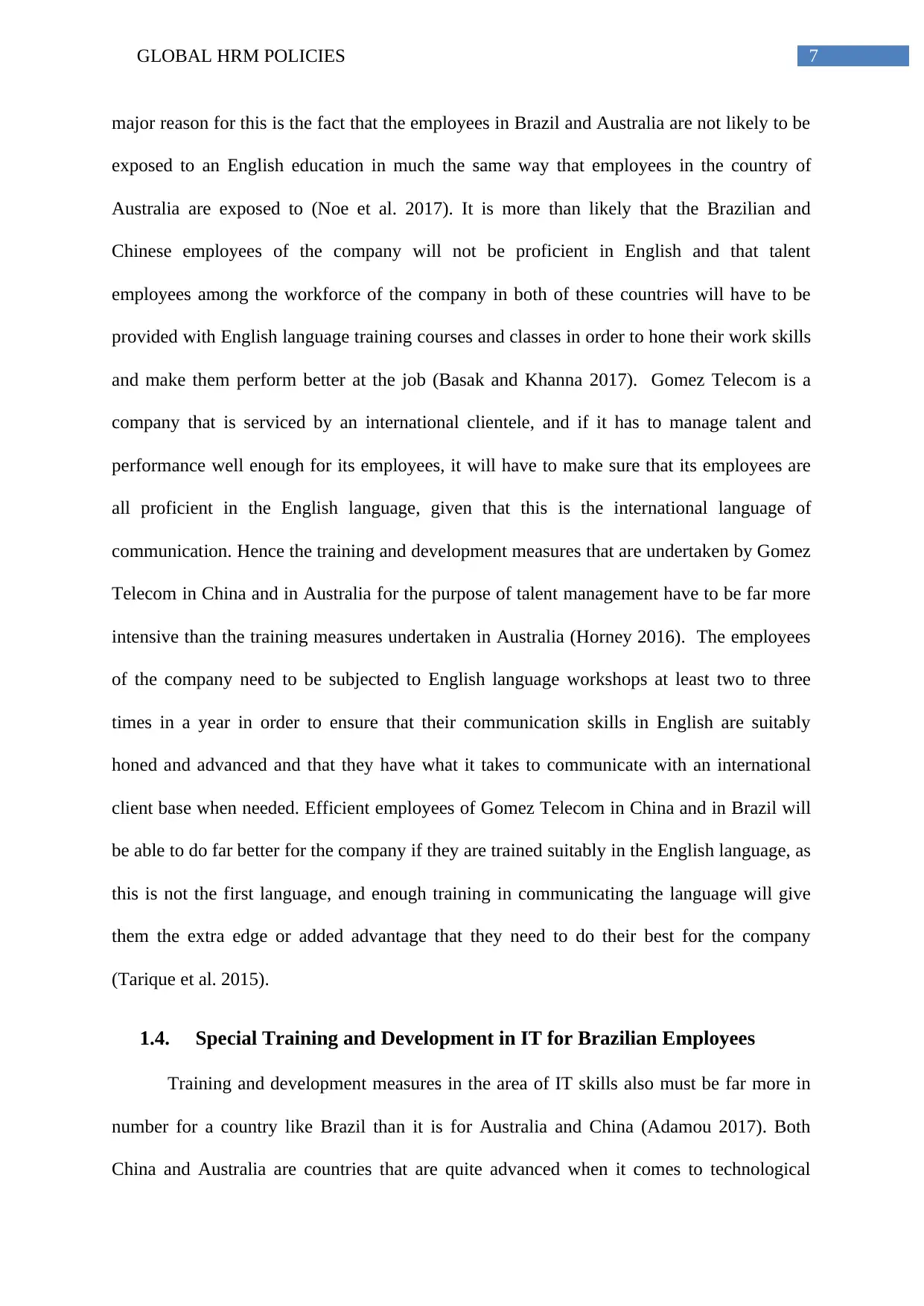
7GLOBAL HRM POLICIES
major reason for this is the fact that the employees in Brazil and Australia are not likely to be
exposed to an English education in much the same way that employees in the country of
Australia are exposed to (Noe et al. 2017). It is more than likely that the Brazilian and
Chinese employees of the company will not be proficient in English and that talent
employees among the workforce of the company in both of these countries will have to be
provided with English language training courses and classes in order to hone their work skills
and make them perform better at the job (Basak and Khanna 2017). Gomez Telecom is a
company that is serviced by an international clientele, and if it has to manage talent and
performance well enough for its employees, it will have to make sure that its employees are
all proficient in the English language, given that this is the international language of
communication. Hence the training and development measures that are undertaken by Gomez
Telecom in China and in Australia for the purpose of talent management have to be far more
intensive than the training measures undertaken in Australia (Horney 2016). The employees
of the company need to be subjected to English language workshops at least two to three
times in a year in order to ensure that their communication skills in English are suitably
honed and advanced and that they have what it takes to communicate with an international
client base when needed. Efficient employees of Gomez Telecom in China and in Brazil will
be able to do far better for the company if they are trained suitably in the English language, as
this is not the first language, and enough training in communicating the language will give
them the extra edge or added advantage that they need to do their best for the company
(Tarique et al. 2015).
1.4. Special Training and Development in IT for Brazilian Employees
Training and development measures in the area of IT skills also must be far more in
number for a country like Brazil than it is for Australia and China (Adamou 2017). Both
China and Australia are countries that are quite advanced when it comes to technological
major reason for this is the fact that the employees in Brazil and Australia are not likely to be
exposed to an English education in much the same way that employees in the country of
Australia are exposed to (Noe et al. 2017). It is more than likely that the Brazilian and
Chinese employees of the company will not be proficient in English and that talent
employees among the workforce of the company in both of these countries will have to be
provided with English language training courses and classes in order to hone their work skills
and make them perform better at the job (Basak and Khanna 2017). Gomez Telecom is a
company that is serviced by an international clientele, and if it has to manage talent and
performance well enough for its employees, it will have to make sure that its employees are
all proficient in the English language, given that this is the international language of
communication. Hence the training and development measures that are undertaken by Gomez
Telecom in China and in Australia for the purpose of talent management have to be far more
intensive than the training measures undertaken in Australia (Horney 2016). The employees
of the company need to be subjected to English language workshops at least two to three
times in a year in order to ensure that their communication skills in English are suitably
honed and advanced and that they have what it takes to communicate with an international
client base when needed. Efficient employees of Gomez Telecom in China and in Brazil will
be able to do far better for the company if they are trained suitably in the English language, as
this is not the first language, and enough training in communicating the language will give
them the extra edge or added advantage that they need to do their best for the company
(Tarique et al. 2015).
1.4. Special Training and Development in IT for Brazilian Employees
Training and development measures in the area of IT skills also must be far more in
number for a country like Brazil than it is for Australia and China (Adamou 2017). Both
China and Australia are countries that are quite advanced when it comes to technological
Paraphrase This Document
Need a fresh take? Get an instant paraphrase of this document with our AI Paraphraser
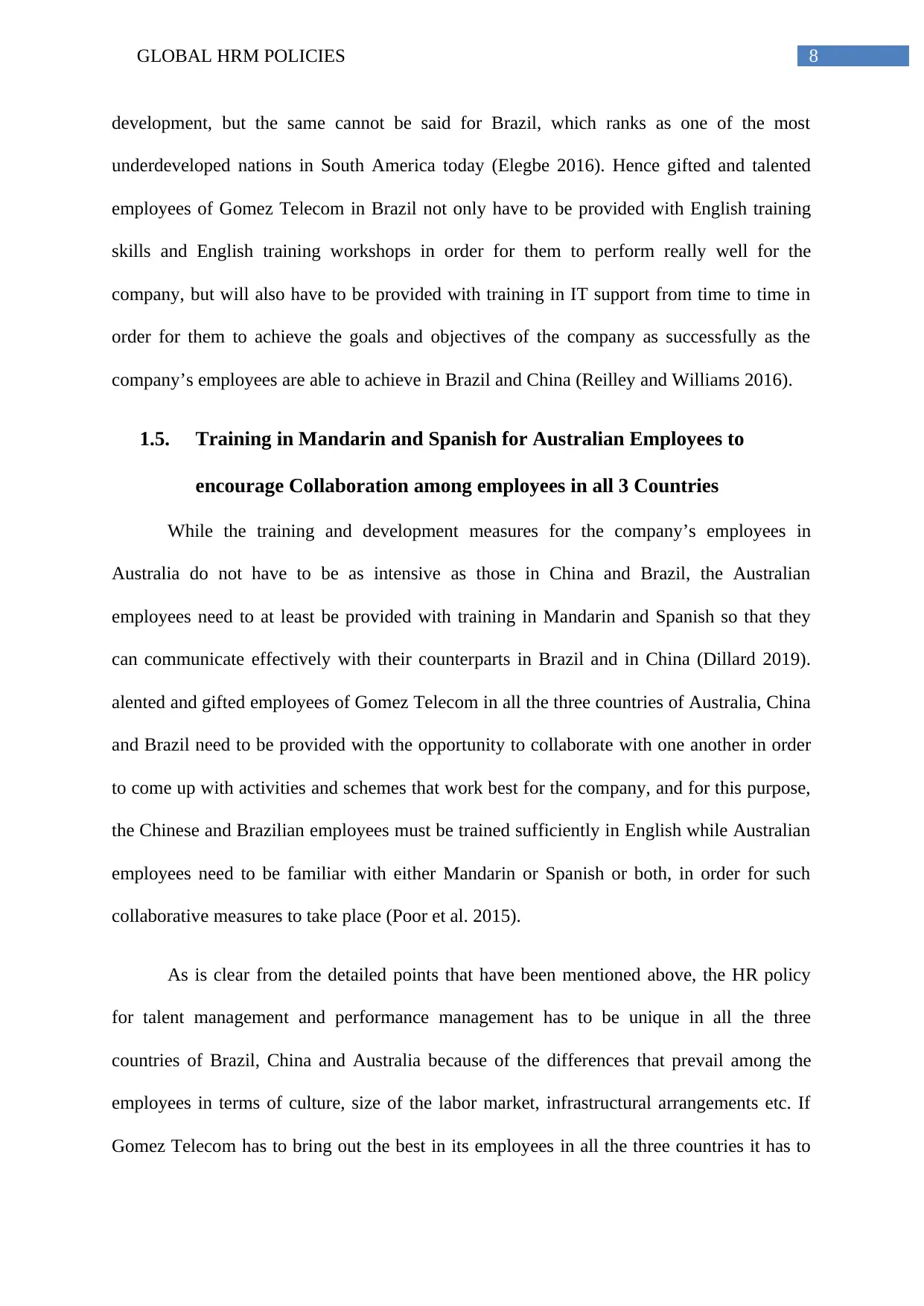
8GLOBAL HRM POLICIES
development, but the same cannot be said for Brazil, which ranks as one of the most
underdeveloped nations in South America today (Elegbe 2016). Hence gifted and talented
employees of Gomez Telecom in Brazil not only have to be provided with English training
skills and English training workshops in order for them to perform really well for the
company, but will also have to be provided with training in IT support from time to time in
order for them to achieve the goals and objectives of the company as successfully as the
company’s employees are able to achieve in Brazil and China (Reilley and Williams 2016).
1.5. Training in Mandarin and Spanish for Australian Employees to
encourage Collaboration among employees in all 3 Countries
While the training and development measures for the company’s employees in
Australia do not have to be as intensive as those in China and Brazil, the Australian
employees need to at least be provided with training in Mandarin and Spanish so that they
can communicate effectively with their counterparts in Brazil and in China (Dillard 2019).
alented and gifted employees of Gomez Telecom in all the three countries of Australia, China
and Brazil need to be provided with the opportunity to collaborate with one another in order
to come up with activities and schemes that work best for the company, and for this purpose,
the Chinese and Brazilian employees must be trained sufficiently in English while Australian
employees need to be familiar with either Mandarin or Spanish or both, in order for such
collaborative measures to take place (Poor et al. 2015).
As is clear from the detailed points that have been mentioned above, the HR policy
for talent management and performance management has to be unique in all the three
countries of Brazil, China and Australia because of the differences that prevail among the
employees in terms of culture, size of the labor market, infrastructural arrangements etc. If
Gomez Telecom has to bring out the best in its employees in all the three countries it has to
development, but the same cannot be said for Brazil, which ranks as one of the most
underdeveloped nations in South America today (Elegbe 2016). Hence gifted and talented
employees of Gomez Telecom in Brazil not only have to be provided with English training
skills and English training workshops in order for them to perform really well for the
company, but will also have to be provided with training in IT support from time to time in
order for them to achieve the goals and objectives of the company as successfully as the
company’s employees are able to achieve in Brazil and China (Reilley and Williams 2016).
1.5. Training in Mandarin and Spanish for Australian Employees to
encourage Collaboration among employees in all 3 Countries
While the training and development measures for the company’s employees in
Australia do not have to be as intensive as those in China and Brazil, the Australian
employees need to at least be provided with training in Mandarin and Spanish so that they
can communicate effectively with their counterparts in Brazil and in China (Dillard 2019).
alented and gifted employees of Gomez Telecom in all the three countries of Australia, China
and Brazil need to be provided with the opportunity to collaborate with one another in order
to come up with activities and schemes that work best for the company, and for this purpose,
the Chinese and Brazilian employees must be trained sufficiently in English while Australian
employees need to be familiar with either Mandarin or Spanish or both, in order for such
collaborative measures to take place (Poor et al. 2015).
As is clear from the detailed points that have been mentioned above, the HR policy
for talent management and performance management has to be unique in all the three
countries of Brazil, China and Australia because of the differences that prevail among the
employees in terms of culture, size of the labor market, infrastructural arrangements etc. If
Gomez Telecom has to bring out the best in its employees in all the three countries it has to
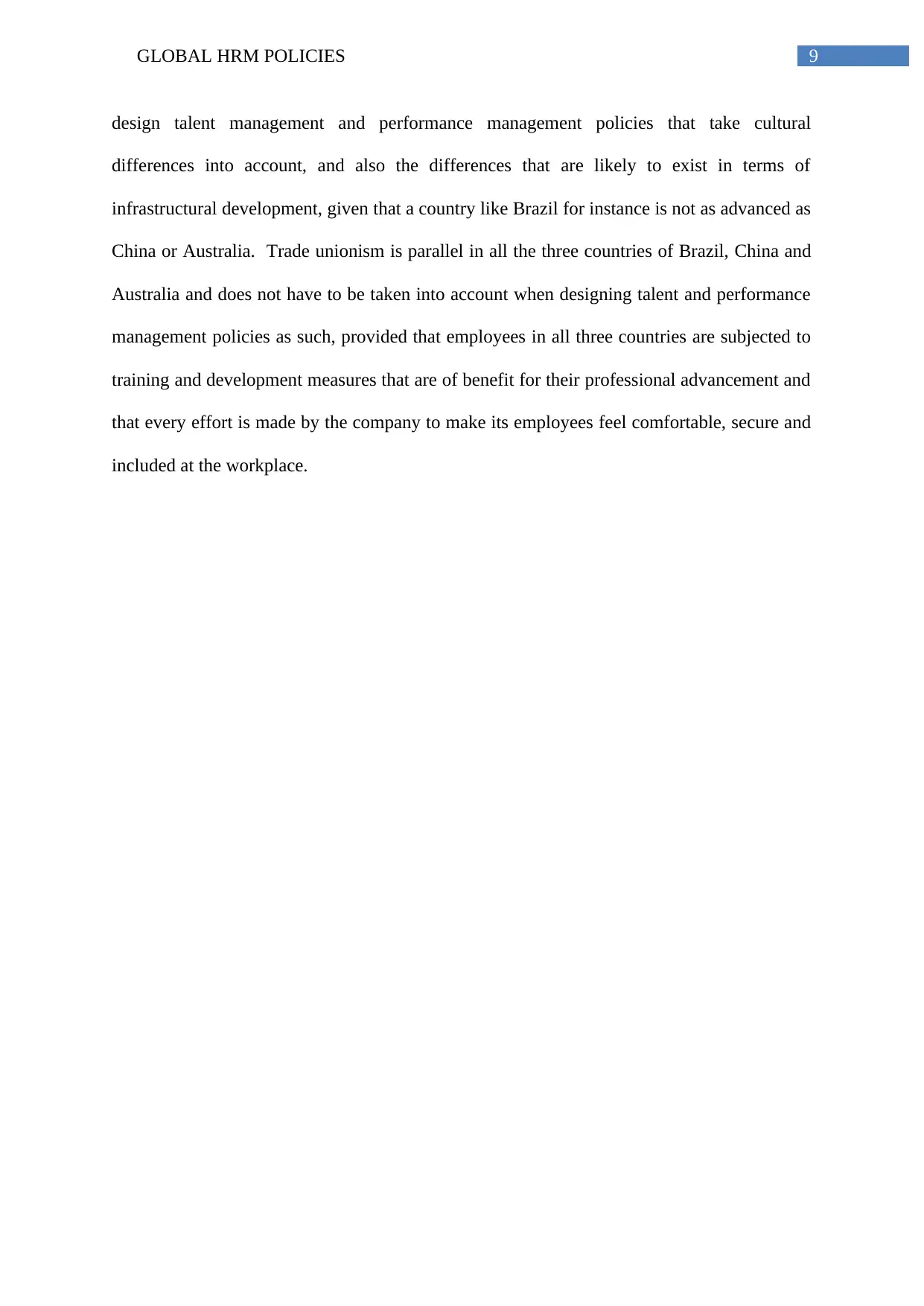
9GLOBAL HRM POLICIES
design talent management and performance management policies that take cultural
differences into account, and also the differences that are likely to exist in terms of
infrastructural development, given that a country like Brazil for instance is not as advanced as
China or Australia. Trade unionism is parallel in all the three countries of Brazil, China and
Australia and does not have to be taken into account when designing talent and performance
management policies as such, provided that employees in all three countries are subjected to
training and development measures that are of benefit for their professional advancement and
that every effort is made by the company to make its employees feel comfortable, secure and
included at the workplace.
design talent management and performance management policies that take cultural
differences into account, and also the differences that are likely to exist in terms of
infrastructural development, given that a country like Brazil for instance is not as advanced as
China or Australia. Trade unionism is parallel in all the three countries of Brazil, China and
Australia and does not have to be taken into account when designing talent and performance
management policies as such, provided that employees in all three countries are subjected to
training and development measures that are of benefit for their professional advancement and
that every effort is made by the company to make its employees feel comfortable, secure and
included at the workplace.
⊘ This is a preview!⊘
Do you want full access?
Subscribe today to unlock all pages.

Trusted by 1+ million students worldwide
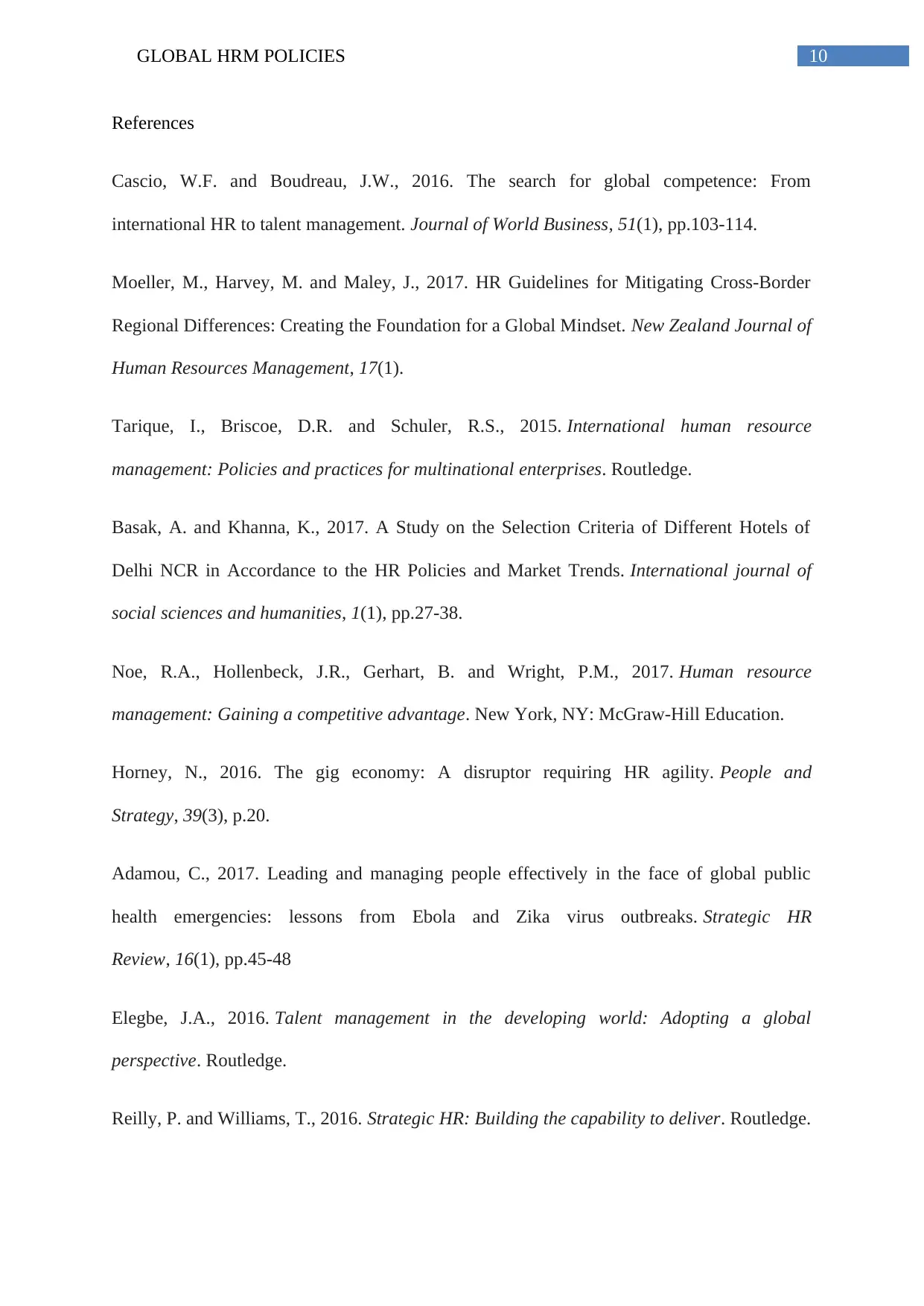
10GLOBAL HRM POLICIES
References
Cascio, W.F. and Boudreau, J.W., 2016. The search for global competence: From
international HR to talent management. Journal of World Business, 51(1), pp.103-114.
Moeller, M., Harvey, M. and Maley, J., 2017. HR Guidelines for Mitigating Cross-Border
Regional Differences: Creating the Foundation for a Global Mindset. New Zealand Journal of
Human Resources Management, 17(1).
Tarique, I., Briscoe, D.R. and Schuler, R.S., 2015. International human resource
management: Policies and practices for multinational enterprises. Routledge.
Basak, A. and Khanna, K., 2017. A Study on the Selection Criteria of Different Hotels of
Delhi NCR in Accordance to the HR Policies and Market Trends. International journal of
social sciences and humanities, 1(1), pp.27-38.
Noe, R.A., Hollenbeck, J.R., Gerhart, B. and Wright, P.M., 2017. Human resource
management: Gaining a competitive advantage. New York, NY: McGraw-Hill Education.
Horney, N., 2016. The gig economy: A disruptor requiring HR agility. People and
Strategy, 39(3), p.20.
Adamou, C., 2017. Leading and managing people effectively in the face of global public
health emergencies: lessons from Ebola and Zika virus outbreaks. Strategic HR
Review, 16(1), pp.45-48
Elegbe, J.A., 2016. Talent management in the developing world: Adopting a global
perspective. Routledge.
Reilly, P. and Williams, T., 2016. Strategic HR: Building the capability to deliver. Routledge.
References
Cascio, W.F. and Boudreau, J.W., 2016. The search for global competence: From
international HR to talent management. Journal of World Business, 51(1), pp.103-114.
Moeller, M., Harvey, M. and Maley, J., 2017. HR Guidelines for Mitigating Cross-Border
Regional Differences: Creating the Foundation for a Global Mindset. New Zealand Journal of
Human Resources Management, 17(1).
Tarique, I., Briscoe, D.R. and Schuler, R.S., 2015. International human resource
management: Policies and practices for multinational enterprises. Routledge.
Basak, A. and Khanna, K., 2017. A Study on the Selection Criteria of Different Hotels of
Delhi NCR in Accordance to the HR Policies and Market Trends. International journal of
social sciences and humanities, 1(1), pp.27-38.
Noe, R.A., Hollenbeck, J.R., Gerhart, B. and Wright, P.M., 2017. Human resource
management: Gaining a competitive advantage. New York, NY: McGraw-Hill Education.
Horney, N., 2016. The gig economy: A disruptor requiring HR agility. People and
Strategy, 39(3), p.20.
Adamou, C., 2017. Leading and managing people effectively in the face of global public
health emergencies: lessons from Ebola and Zika virus outbreaks. Strategic HR
Review, 16(1), pp.45-48
Elegbe, J.A., 2016. Talent management in the developing world: Adopting a global
perspective. Routledge.
Reilly, P. and Williams, T., 2016. Strategic HR: Building the capability to deliver. Routledge.
Paraphrase This Document
Need a fresh take? Get an instant paraphrase of this document with our AI Paraphraser
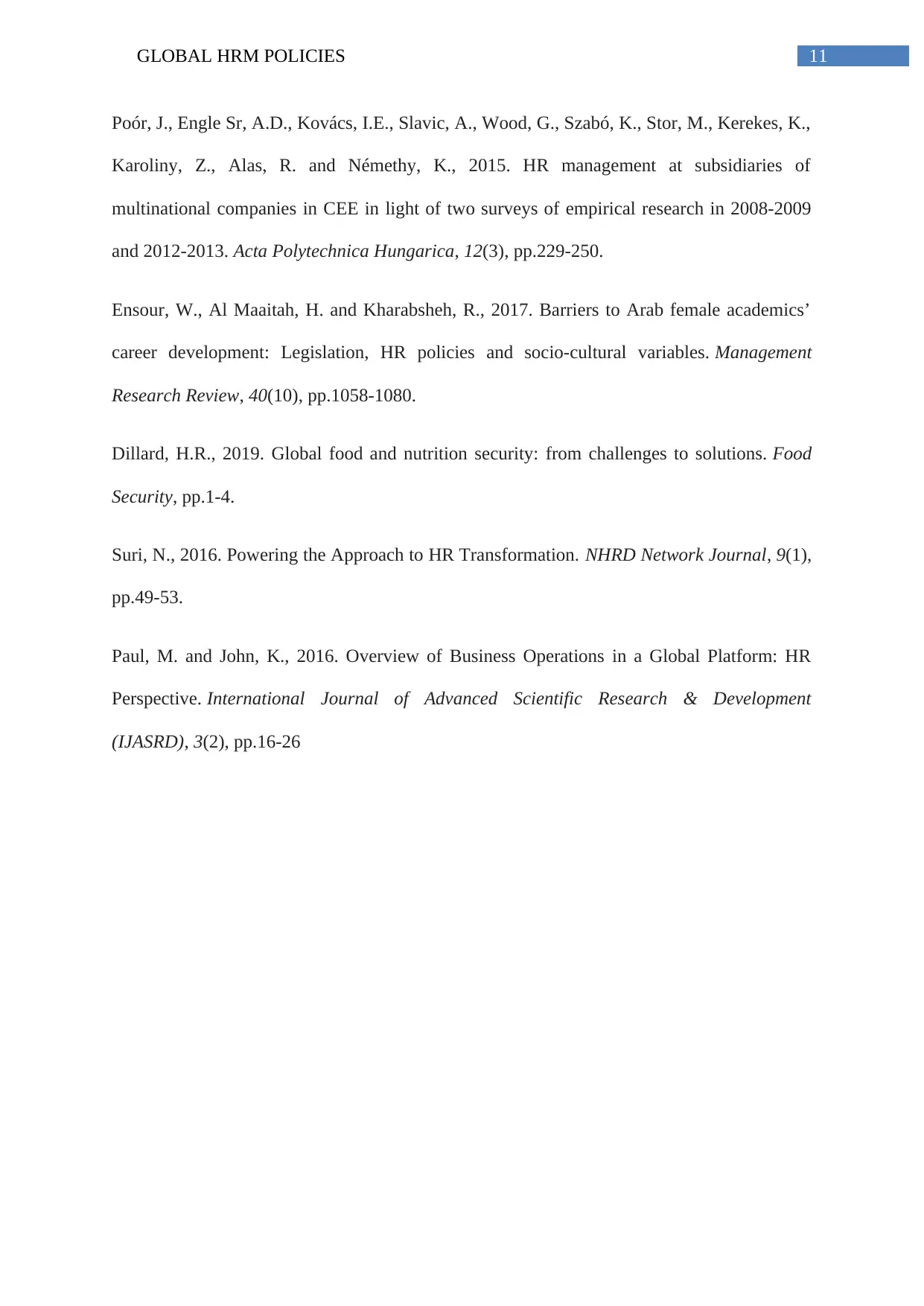
11GLOBAL HRM POLICIES
Poór, J., Engle Sr, A.D., Kovács, I.E., Slavic, A., Wood, G., Szabó, K., Stor, M., Kerekes, K.,
Karoliny, Z., Alas, R. and Némethy, K., 2015. HR management at subsidiaries of
multinational companies in CEE in light of two surveys of empirical research in 2008-2009
and 2012-2013. Acta Polytechnica Hungarica, 12(3), pp.229-250.
Ensour, W., Al Maaitah, H. and Kharabsheh, R., 2017. Barriers to Arab female academics’
career development: Legislation, HR policies and socio-cultural variables. Management
Research Review, 40(10), pp.1058-1080.
Dillard, H.R., 2019. Global food and nutrition security: from challenges to solutions. Food
Security, pp.1-4.
Suri, N., 2016. Powering the Approach to HR Transformation. NHRD Network Journal, 9(1),
pp.49-53.
Paul, M. and John, K., 2016. Overview of Business Operations in a Global Platform: HR
Perspective. International Journal of Advanced Scientific Research & Development
(IJASRD), 3(2), pp.16-26
Poór, J., Engle Sr, A.D., Kovács, I.E., Slavic, A., Wood, G., Szabó, K., Stor, M., Kerekes, K.,
Karoliny, Z., Alas, R. and Némethy, K., 2015. HR management at subsidiaries of
multinational companies in CEE in light of two surveys of empirical research in 2008-2009
and 2012-2013. Acta Polytechnica Hungarica, 12(3), pp.229-250.
Ensour, W., Al Maaitah, H. and Kharabsheh, R., 2017. Barriers to Arab female academics’
career development: Legislation, HR policies and socio-cultural variables. Management
Research Review, 40(10), pp.1058-1080.
Dillard, H.R., 2019. Global food and nutrition security: from challenges to solutions. Food
Security, pp.1-4.
Suri, N., 2016. Powering the Approach to HR Transformation. NHRD Network Journal, 9(1),
pp.49-53.
Paul, M. and John, K., 2016. Overview of Business Operations in a Global Platform: HR
Perspective. International Journal of Advanced Scientific Research & Development
(IJASRD), 3(2), pp.16-26
1 out of 11
Related Documents
Your All-in-One AI-Powered Toolkit for Academic Success.
+13062052269
info@desklib.com
Available 24*7 on WhatsApp / Email
![[object Object]](/_next/static/media/star-bottom.7253800d.svg)
Unlock your academic potential
Copyright © 2020–2025 A2Z Services. All Rights Reserved. Developed and managed by ZUCOL.





